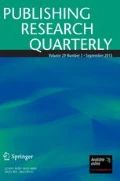Abstract
Book reviews are an indicator of information and knowledge flow. This study explores and discusses the importance of disciplinary cultures among academic disciplines and disciplinary influence. Utilizing book reviews in disciplinary publications in history for the years 2016–2020, from two canonical history databases, a bibliometric view emerging of a selection of subjects reviewed in journals not associated with the disciplinary subject of research. Examination of book reviews for the fluidity of knowledge in academic disciplines provides evidence of information and knowledge flow in publishing academic books. Data and discussion further frames and situates the growing hybridization of subjects of research and their disciplinary publishing. Book reviews, as a barometer and approach to examining this phenomenon, illustrates book reviewing vis-à-vis academic disciplinary journals that are receptive to other disciplinary objects of research, not generally associated with that discipline. As scholarly research continues to metamorphose, book reviewing assumes a receptive and broader intellectual and publishing ecology.






Similar content being viewed by others
Notes
Sovietology is an illustrative example of a domain of knowledge, which originated with the Cold War, only to become moribund and vanish from the academic sense once the Soviet Union collapsed.
Some societal flagship journals place a concerted emphasis on book reviewing, e.g. especially American Historical Review, as well as Journal of American History.
As digital humanities, geo-humanities, and GIS approaches flourish within the academy, more such cross-disciplinary book reviewing will take place.
Per A.H.R. statement, expressing reviewing a wide range of scholarship: “Reviewing books and other historical material of professional interest—including films, public history sites and museums, collections of documents, websites, podcasts, and many genres of popular culture relevant to historians—is a primary responsibility of the AHR.” https://academic.oup.com/ahr/pages/reviews_guide. Retrieved 5/5/21; Per JAH statement: “The Journal of American History aims to be a journal of record that enables readers to keep abreast of what is produced in the field of American history. By making readers aware of new books and helping them identify and assess those useful to them, the editorial board and staff of the JAH hope to assure its role as a journal of record and to sustain historical scholarship. The Journal does not accept unsolicited book reviews.” https://jah.oah.org/submit/book-reviews/. Retrieved 5/5/21.
References
Abbott A. Chaos of disciplines. Chicago: University of Chicago Press; 2001.
Becher T. Towards a definition of disciplinary cultures. Stud High Educ. 1981;6:109–22.
Brown R. Reasons for publishing scholarly book reviews from a journal editor’s perspective. J Schol Publish. 2018;50(1):21–5.
Buchanan AL, Hérubel JPVM. Interdisciplinarity: the case of historical geography through citation analysis. Collect Build. 1994;14(1):15–21.
Campbell D. Ethnocentrism of disciplines and the fish-scale model of omniscience. In: Sherif M, Sherif CW, editors. Interdisciplinary relationships in the social sciences. Chicago: Aldine; 1969. p. 328–48.
Champion DJ, Morris MF. A content analysis of book reviews in the AJS, ASR, and Social Forces. The Am Sociolog Rev. 1973;78(5):1256–65.
Hérubel JPVM. Disciplinary permeability, academic specializations, and university presses. Publish Res Quart. 2020;36(1):17–31.
Hartley J. Reading and writing book reviews across the disciplines. J Am Soc Inform Sci Technol. 2006;57(9):1194–207.
Hérubel Jean-Pierre VM. Situating clio’s influence in humanities and social science monographs: disciplinary affiliations and historical scholarship. J Sch Publ. 2009;41:56–66.
Hérubel, Jean-Pierre V. M. "Interdisciplinary Characteristics of Historical Monographs and Intellectual Interactions at Work in Historical Scholarship: An Exploratory Discussion." In Estonian Research Council and COLLNET 9th International Conference on Webometrics, Informetrics and Scientometrics and 14th COLLNET Meeting Proceedings, Tartu, Estonia (August 15–17, 2013): pp. 240–252.
Hérubel JP, Goedeken EA. University presses and emerging disciplinary confgurations and orientations: an exploration and discussion. Publish Res Quart. 2019;35(1):39–51.
Hérubel JP. The book review landscape in american history: specialization, segmentation, value, and history journals. Publish Res Quart. 2020;36(3):350–64.
Lamont M. How professors think: inside the curious world of academic judgment. Cambridge: Harvard University Press; 2009.
Lindholm-Romantschuk Y. Scholarly book reviewing in the social sciences and humanities: the flow of ideas within and among disciplines. Westport: Greenwood Press; 1998.
Perry S. Who do you think you are? Reading, authority, and book reviewing. J Sch Publ. 2018;50(1):12–5.
Shapin S. “Discipline and bounding: the history and sociology of science as seen through the externalism-internalism debate. Hist Sci. 1992;30:333–69.
Stahl L. So what if it’s not the New York times why one university press seeks book reviews in scholarly journals. J Schol Publish. 2018;50(1):8–11.
Stowe S. Thinking about reviews. J Am History. 1991;78(2):591–5.
Zuccala A. Thed van Leeuwen, “Book reviews in humanities research evaluations.” J Am Soci Info Sci Tech. 2011;62:1979–91.
Author information
Authors and Affiliations
Corresponding author
Additional information
Publisher's Note
Springer Nature remains neutral with regard to jurisdictional claims in published maps and institutional affiliations.
Rights and permissions
About this article
Cite this article
Hérubel, JP.V.M. Disciplinary Fluidity: Academic Journals, Book Reviewing, Information and Knowledge Flow. Pub Res Q 37, 407–419 (2021). https://doi.org/10.1007/s12109-021-09824-7
Accepted:
Published:
Issue Date:
DOI: https://doi.org/10.1007/s12109-021-09824-7




